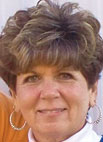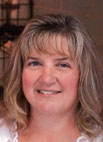
Hurricane Rita came blaring through in 2005 destroying the hospital in Orange, Texas where John Pickering was Maintenance Director. “I helped close it down. When the last helicopter took our last ICU patient, I left right behind them,” John said. “There were only three people that stayed to make sure all the patients got out. John was one of them. He saved a lot of lives. He is my hero,” Cheryl, John’s wife, said. Cheryl wanted to come home to Arkansas after the hurricane. John had to return to the hospital the following day to start rebuilding it. He stayed, working 12-hour days for the next six weeks, getting the hospital back up and running. After Rita, John and Cheryl officially moved to Arkansas for good. But they have been back several times since, most recently after Hurricane Ike, to help John's father.
Now at home in Gravette, Ark., Cheryl and John raise Boer show goats. “The show goat market has just exploded around here. We provide show goats for Benton and Washington counties in Arkansas, Delaware and Adair counties in Oklahoma and McDonald County in Missouri,” Cheryl said. “We mostly provide show goats for the 4-H and FFA kids. Last year at the Benton County Fair there were 189 show goats. It is the most popular event now at county fairs,” she continued. Cheryl attributes the popularity of showing goats partly to their ease in handling and economics. “Goats don’t take up much room, they cost less to buy and require less feed. Even city kids can have a goat. I think it is getting more kids involved in livestock by showing goats,” Cheryl said.
“We just have a ball with the kids. We get to meet the nicest people,” she smiled. “We just enjoy watching the students grow and develop as they work with their animal. We truly believe that kids who work with animals learn a lot of responsibility, self confidence and tend to grow up as caring, responsible adults. We really enjoy that part of raising our goats and selling them to the kids,” she added. “We love working with the goats, but the satisfaction of raising the animals comes through watching the children grow and develop. To me, that is more important than raising the animals,” Cheryl said.
John and Cheryl sell breeding stock and for the show market. “The first year we had a goat go to the fair, she got grand champion,” Cheryl said. Many of the kids Cheryl and John have sold goats to call them and want the Pickerings to come see them work their goats. John said, “We make all the shows. We follow these kids around to the jackpots and fairs to watch them.”
Cheryl suggested people who are interested in raising goats start out small. “It is best to start out small and learn about the animal and then build up your herd,” she said. Cheryl suggests checking out the American Boar Goat Association standards for breed characteristics. Cheryl uses these standards to teach kids how to pick out their baby show goats in addition to several other tricks they have learned over the years. They also try to educate the kids on medications, type of feeds, feed amounts and even exercise. “We are going to offer a showmanship clinic for the first time this year with an expert from San Antonio, Texas. He has been showing goats for 30 years and helping kids develop their showmanship skills. We hope to have it at the end of June so the kids have several months to practice before they show.”
John’s dad, and John and Cheryl's kids and grandkids plan vacations at the farm. “Dad spent the summer with us and is coming up at the end of the month to spend the winter here too,” John said. “He will come back to help us with birthing season. Birthing season is kind of hectic. It all happens in about two weeks. We go from 30 goats to 90. I drove up after work one day and five does were having babies,” he added. “When the grandkids come out, they bring their ipods and stuff with them but, after a day or two they forget all about them,” John smiled.







